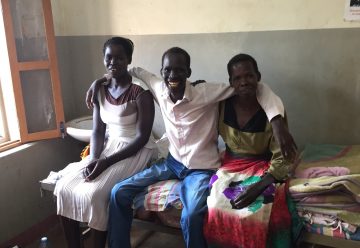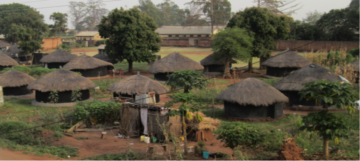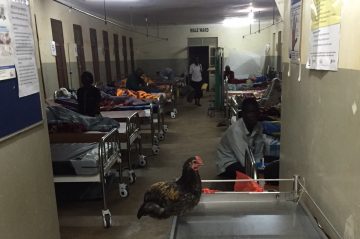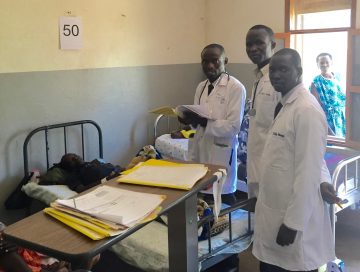Submitted by Dr. Jan Hajek

Ready to go home! Eric, pictured with his wife and his mother, was admitted to hospital with weight loss, fevers, left-sided weakness and seizures. He was diagnosed with HIV; his CD4 count was 9. He was extremely ill and really struggled – but, thanks to his ever-present and supportive wife and mother he pulled through. He’ll be back to driving his motorcycle-taxi soon and his 3 kids will be very happy to see him!
The number of field-based global heath electives is increasing as the pressing need to address global health inequities is recognized among trainees, educators, and clinicians.
The growing partnership between the UBC Department of Medicine and Gulu Referral Hospital in Uganda serves as a model program of a mutually beneficial platform for global health clinical electives.
Modern medicine has made tremendous advances. But the harsh reality is that millions of people around the world still suffer and die due to lack of access to even basic medical care.
The need to address global health inequities is increasingly recognized among trainees, educators, and clinicians.
In 2013, the UBC Department of Medicine International Health Program (IHP) formed a partnership with Gulu Regional Referral Hospital (GRRH), a teaching hospital affiliated with Gulu University, located in a poor, post-conflict area in northern Uganda.
Gulu Regional Referral Hospital is a very different hospital setting than hospitals in Canada. Most of the patients at GRRH struggle daily to find food to eat. The region is now at peace, but many have been terribly affected by the previous conflict with the Lord’s Resistance Army (LRA).

Houses located near the Gulu Regional Referral Hospital in Northern Uganda. The region is now peaceful, but is still reeling from over 20 years of civil war and conflict with the Lord’s Resistance Army – a rebel group notorious for committing atrocities and using child soldiers.
Irene, one of the patients on the ward now, was recently admitted with profound cachexia, weakness and newly diagnosed with HIV and TB. She was previously abducted by the LRA and forced to work as a soldier/wife. She had 2 children during her time with the LRA. Several years ago, she escaped after 16 years with the LRA, only to find that her parents had been killed. She lacks family support and now lives alone with her 2 children struggling to make ends meet, especially these past few months when she fell sick.
Through the IHP, clinical faculty and medical residents from UBC are able to go to Gulu for short-term medical rotations to assist in medical care, research, and training at GRRH.

Photo of the medical ward on a quiet evening. A chicken had wandered in from outside. The windows and doors are encouraged to stay open to increase ventilation and reduce transmission of TB – the number one reason for admission to hospital.

Itye ninning? How are you feeling? Dr. Simple Ouma, medical officer (centre) and two interns, looking sharp, reviewing patients on rounds. Most patients speak Acholi, the local dialect. English is taught at schools, is used in all hospital records and spoken by all hospital staff.
Each year the Internal Medicine residency program at UBC sends 12 residents and 4 – 8 faculty. The UBC teams provide clinical service and support the interns and medical officers on the wards. They are also integrated into the teaching schedules and provide both bedside and classroom-based teaching for medical students from Gulu University medical school. The UBC residents have ranked the rotation as one of the most valuable of their training and a number of faculty members are now returning to Gulu for their 4th year in support of the program.
The program has been successful and appreciated by trainees and staff from both UBC and Gulu. However, GRRH remains critically short staffed. Due in large part to very high workloads and low government salaries the hospital has been unable to retain full time doctors to work on the medical ward.

A bittersweet end-of rotation group photo as our residents and faculty supervisor pose for a photo at the end of their one-month rotation with some of the staff on the medical ward.
This year the IHP has started a new phase in its partnership with Gulu – two new Ugandan doctors were hired – jointly funded by the IHP, GRRH and the Ugandan Ministry of Health. The two doctors, Dr. Simple Ouma and Dr. Patrick Opira, are young, recent graduates, motivated, and eager to learn more. They will provide patient care on the medical ward and work closely with the visiting UBC medical teams.
The financial contribution required from the IHP to support both Simple and Patrick (providing 60% of their total salaries) is only $15,000 per year. The IHP team is prepared to cover these costs, but would also like to share this opportunity to concretely contribute to global health equity with the broader UBC community and its supporters. A special fund for charitable donations and UBC webpage has been created.
https://support.ubc.ca/projects/international-health-project/
The UBC faculty of medicine is committed to excellence in medical care, including research, training, and service delivery. On their rotations in Gulu, medical residents from UBC are not only learning how difficult and unfair things can sometimes be for people who fall sick in a poor country; they are also learning why that is, and how we can to make it better. The UBC IHP-Gulu partnership demonstrates the benefits that UBC gains from sustained engagement at an institutional level with partners in resource poor settings.
Through partnerships with other institutions like GRRH, our expertise and skills can be applied to the challenges faced by those living in the developing world and the realities and competencies of the developing world can be better appreciated allowing for a better understanding of global health.